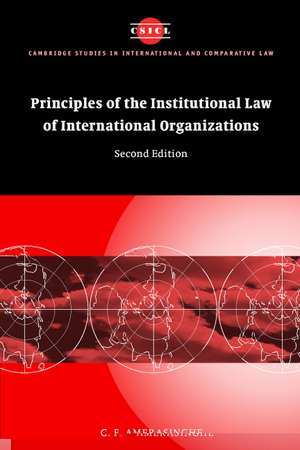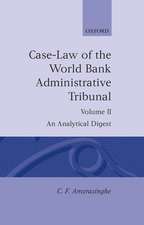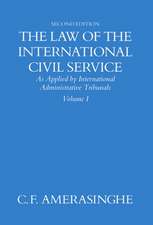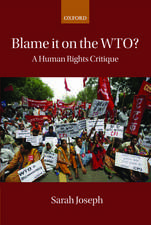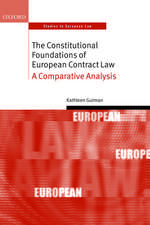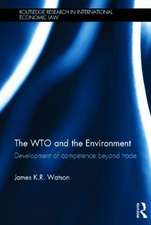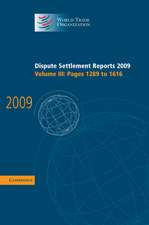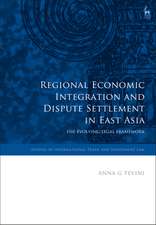Principles of the Institutional Law of International Organizations: Cambridge Studies in International and Comparative Law, cartea 36
Autor C. F. Amerasingheen Limba Engleză Paperback – 16 feb 2005
| Toate formatele și edițiile | Preț | Express |
|---|---|---|
| Paperback (1) | 518.51 lei 6-8 săpt. | |
| Cambridge University Press – 16 feb 2005 | 518.51 lei 6-8 săpt. | |
| Hardback (1) | 818.16 lei 6-8 săpt. | |
| Cambridge University Press – 16 feb 2005 | 818.16 lei 6-8 săpt. |
Din seria Cambridge Studies in International and Comparative Law
- 9%
 Preț: 731.44 lei
Preț: 731.44 lei -
 Preț: 176.91 lei
Preț: 176.91 lei -
 Preț: 200.33 lei
Preț: 200.33 lei - 9%
 Preț: 661.94 lei
Preț: 661.94 lei -
 Preț: 231.74 lei
Preț: 231.74 lei -
 Preț: 233.37 lei
Preț: 233.37 lei - 9%
 Preț: 661.79 lei
Preț: 661.79 lei -
 Preț: 201.39 lei
Preț: 201.39 lei -
 Preț: 230.94 lei
Preț: 230.94 lei - 9%
 Preț: 1013.73 lei
Preț: 1013.73 lei - 9%
 Preț: 765.90 lei
Preț: 765.90 lei -
 Preț: 237.53 lei
Preț: 237.53 lei - 9%
 Preț: 773.84 lei
Preț: 773.84 lei -
 Preț: 329.28 lei
Preț: 329.28 lei - 14%
 Preț: 793.62 lei
Preț: 793.62 lei -
 Preț: 238.11 lei
Preț: 238.11 lei - 9%
 Preț: 596.72 lei
Preț: 596.72 lei - 9%
 Preț: 593.36 lei
Preț: 593.36 lei -
 Preț: 209.39 lei
Preț: 209.39 lei - 9%
 Preț: 917.65 lei
Preț: 917.65 lei -
 Preț: 239.72 lei
Preț: 239.72 lei -
 Preț: 238.11 lei
Preț: 238.11 lei - 11%
 Preț: 639.92 lei
Preț: 639.92 lei -
 Preț: 350.03 lei
Preț: 350.03 lei - 14%
 Preț: 784.65 lei
Preț: 784.65 lei -
 Preț: 310.86 lei
Preț: 310.86 lei - 14%
 Preț: 731.56 lei
Preț: 731.56 lei - 14%
 Preț: 698.80 lei
Preț: 698.80 lei - 14%
 Preț: 700.76 lei
Preț: 700.76 lei -
 Preț: 288.04 lei
Preț: 288.04 lei - 14%
 Preț: 757.69 lei
Preț: 757.69 lei - 14%
 Preț: 721.96 lei
Preț: 721.96 lei -
 Preț: 284.78 lei
Preț: 284.78 lei - 11%
 Preț: 642.00 lei
Preț: 642.00 lei - 14%
 Preț: 896.01 lei
Preț: 896.01 lei -
 Preț: 358.28 lei
Preț: 358.28 lei - 9%
 Preț: 662.73 lei
Preț: 662.73 lei - 14%
 Preț: 759.18 lei
Preț: 759.18 lei - 14%
 Preț: 703.42 lei
Preț: 703.42 lei -
 Preț: 363.28 lei
Preț: 363.28 lei -
 Preț: 464.33 lei
Preț: 464.33 lei - 14%
 Preț: 786.15 lei
Preț: 786.15 lei
Preț: 518.51 lei
Preț vechi: 582.59 lei
-11% Nou
Puncte Express: 778
Preț estimativ în valută:
99.23€ • 102.51$ • 82.58£
99.23€ • 102.51$ • 82.58£
Carte tipărită la comandă
Livrare economică 25 martie-08 aprilie
Preluare comenzi: 021 569.72.76
Specificații
ISBN-13: 9780521545570
ISBN-10: 0521545579
Pagini: 574
Dimensiuni: 152 x 229 x 32 mm
Greutate: 0.75 kg
Ediția:Revizuită
Editura: Cambridge University Press
Colecția Cambridge University Press
Seria Cambridge Studies in International and Comparative Law
Locul publicării:Cambridge, United Kingdom
ISBN-10: 0521545579
Pagini: 574
Dimensiuni: 152 x 229 x 32 mm
Greutate: 0.75 kg
Ediția:Revizuită
Editura: Cambridge University Press
Colecția Cambridge University Press
Seria Cambridge Studies in International and Comparative Law
Locul publicării:Cambridge, United Kingdom
Cuprins
Preface; List of abbreviations; Table of cases; 1. Introduction; 2. Interpretation of texts; 3. Legal personality; 4. Membership and representation; 5. Non-judicial organs of organizations; 6. Acts of non-judicial organs: their legal effect; 7. Acts of non-judicial organs: the doctrine of ultra vires; 8. Judicial organs; 9. The internal law: employment relations; 10. Privileges and immunities; 11. Financing; 12. Responsibility to and of international organizations; 13. The liability of member states vis-a-vis third parties; 14. Amendment of constitutions; 15. Dissolution and succession; 16. The peaceful settlement of disputes; Index.
Recenzii
'Principles of the Institutional Law of International Organizations is still one of the best general works available on organizations.' Netherlands International Law Review
'… analytical and explanatory, and the author reasons and discusses issues in depth. … answers hypothetical questions where the development in legislation or legal practice has not yet become firm enough to be able to offer an answer to the numerous questions that still remain open in the field of international institutional law. … Amerasinghe commendably dares to take the extra step from the law in force to the law in the making and offers suggestions for solutions, which suggestions may well contribute to the development of the law.' International Organizations Law Review
'… when the first edition of C. F. Amerasinghe's book on international organizations was published there was a gap in the literature on the topic. There was a need for an up-to-date book that could serve as a manageable guide to institutional law … The book … met the need so effectively that its structuring of institutional law is still today of some impact. … the merits of the book have been located in its general characterization of institutional law, in the identification of both possibilities and limits to the very idea of a law of organizations, and in pinpointing the relationship of institutional law to other areas of international law. … The first question that arises is why a revision is necessary. Amerasinghe answers this question himself. The ever increasing attention paid to judicial organs of organizations required including them into the book.' Netherlands International Law Review
'… analytical and explanatory, and the author reasons and discusses issues in depth. … answers hypothetical questions where the development in legislation or legal practice has not yet become firm enough to be able to offer an answer to the numerous questions that still remain open in the field of international institutional law. … Amerasinghe commendably dares to take the extra step from the law in force to the law in the making and offers suggestions for solutions, which suggestions may well contribute to the development of the law.' International Organizations Law Review
'… when the first edition of C. F. Amerasinghe's book on international organizations was published there was a gap in the literature on the topic. There was a need for an up-to-date book that could serve as a manageable guide to institutional law … The book … met the need so effectively that its structuring of institutional law is still today of some impact. … the merits of the book have been located in its general characterization of institutional law, in the identification of both possibilities and limits to the very idea of a law of organizations, and in pinpointing the relationship of institutional law to other areas of international law. … The first question that arises is why a revision is necessary. Amerasinghe answers this question himself. The ever increasing attention paid to judicial organs of organizations required including them into the book.' Netherlands International Law Review
Descriere
New chapter on judicial organs of international organizations; updated chapter on dispute settlement.
